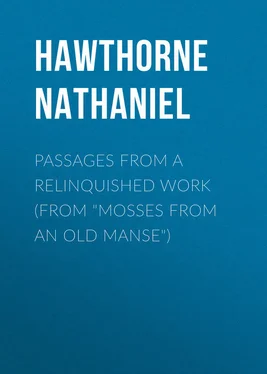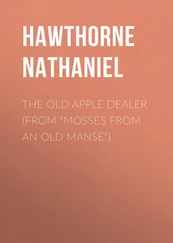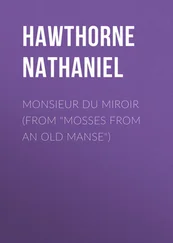Nathaniel Hawthorne - Passages from a Relinquished Work (From Mosses from an Old Manse)
Здесь есть возможность читать онлайн «Nathaniel Hawthorne - Passages from a Relinquished Work (From Mosses from an Old Manse)» — ознакомительный отрывок электронной книги совершенно бесплатно, а после прочтения отрывка купить полную версию. В некоторых случаях можно слушать аудио, скачать через торрент в формате fb2 и присутствует краткое содержание. Жанр: literature_19, foreign_antique, foreign_prose, на английском языке. Описание произведения, (предисловие) а так же отзывы посетителей доступны на портале библиотеки ЛибКат.
- Название:Passages from a Relinquished Work (From Mosses from an Old Manse)
- Автор:
- Жанр:
- Год:неизвестен
- ISBN:нет данных
- Рейтинг книги:5 / 5. Голосов: 1
-
Избранное:Добавить в избранное
- Отзывы:
-
Ваша оценка:
- 100
- 1
- 2
- 3
- 4
- 5
Passages from a Relinquished Work (From Mosses from an Old Manse): краткое содержание, описание и аннотация
Предлагаем к чтению аннотацию, описание, краткое содержание или предисловие (зависит от того, что написал сам автор книги «Passages from a Relinquished Work (From Mosses from an Old Manse)»). Если вы не нашли необходимую информацию о книге — напишите в комментариях, мы постараемся отыскать её.
Passages from a Relinquished Work (From Mosses from an Old Manse) — читать онлайн ознакомительный отрывок
Ниже представлен текст книги, разбитый по страницам. Система сохранения места последней прочитанной страницы, позволяет с удобством читать онлайн бесплатно книгу «Passages from a Relinquished Work (From Mosses from an Old Manse)», без необходимости каждый раз заново искать на чём Вы остановились. Поставьте закладку, и сможете в любой момент перейти на страницу, на которой закончили чтение.
Интервал:
Закладка:
Nathaniel Hawthorne
Passages from a Relinquished Work (From «Mosses from an Old Manse»)
AT HOME
From infancy I was under the guardianship of a village parson, who made me the subject of daily prayer and the sufferer of innumerable stripes, using no distinction, as to these marks of paternal love, between myself and his own three boys. The result, it must be owned, has been very different in their cases and mine, they being all respectable men and well settled in life; the eldest as the successor to his father’s pulpit, the second as a physician, and the third as a partner in a wholesale shoe-store; while I, with better prospects than either of them, have run the course which this volume will describe. Yet there is room for doubt whether I should have been any better contented with such success as theirs than with my own misfortunes, – at least, till after my experience of the latter had made it too late for another trial.
My guardian had a name of considerable eminence, and fitter for the place it occupies in ecclesiastical history than for so frivolous a page as mine. In his own vicinity, among the lighter part of his hearers, he was called Parson Thumpcushion, from the very forcible gestures with which he illustrated his doctrines. Certainly, if his powers as a preacher were to be estimated by the damage done to his pulpit-furniture, none of his living brethren, and but few dead ones, would have been worthy even to pronounce a benediction after him. Such pounding and expounding the moment he began to grow warm, such slapping with his open palm, thumping with his closed fist, and banging with the whole weight of the great Bible, convinced me that he held, in imagination, either the Old Nick or some Unitarian infidel at bay, and belabored his unhappy cushion as proxy for those abominable adversaries. Nothing but this exercise of the body while delivering his sermons could have supported the good parson’s health under the mental toil which they cost him in composition.
Though Parson Thumpcushion had an upright heart, and some called it a warm one, he was invariably stern and severe, on principle, I suppose, to me. With late justice, though early enough, even now, to be tinctured with generosity I acknowledge him to have been a good and wise man after his own fashion. If his management failed as to myself, it succeeded with his three sons; nor, I must frankly say, could any mode of education with which it was possible for him to be acquainted have made me much better than what I was or led me to a happier fortune than the present. He could neither change the nature that God gave me nor adapt his own inflexible mind to my peculiar character. Perhaps it was my chief misfortune that I had neither father nor mother alive; for parents have an instinctive sagacity in regard to the welfare of their children, and the child feels a confidence both in the wisdom and affection of his parents which he cannot transfer to any delegate of their duties, however conscientious. An orphan’s fate is hard, be he rich or poor. As for Parson Thumpcushion, whenever I see the old gentleman in my dreams he looks kindly and sorrowfully at me, holding out his hand as if each had something to forgive. With such kindness and such forgiveness, but without the sorrow, may our next meeting be!
I was a youth of gay and happy temperament, with an incorrigible levity of spirit, of no vicious propensities, sensible enough, but wayward and fanciful. What a character was this to be brought in contact with the stern old Pilgrim spirit of my guardian! We were at variance on a thousand points; but our chief and final dispute arose from the pertinacity with which he insisted on my adopting a particular profession; while I, being heir to a moderate competence, had avowed my purpose of keeping aloof from the regular business of life. This would have been a dangerous resolution anywhere in the world; it was fatal in New England. There is a grossness in the conceptions of my countrymen; they will not be convinced that any good thing may consist with what they call idleness; they can anticipate nothing but evil of a young man who neither studies physic, law, nor gospel, nor opens a store, nor takes to farming, but manifests an incomprehensible disposition to be satisfied with what his father left him. The principle is excellent in its general influence, but most miserable in its effect on the few that violate it. I had a quick sensitiveness to public opinion, and felt as if it ranked me with the tavern haunters and town paupers, – with the drunken poet who hawked his own Fourth of July odes, and the broken soldier who had been good for nothing since last war. The consequence of all this was a piece of light-hearted desperation.
I do not over-estimate my notoriety when I take it for granted that many of my readers must have heard of me in the wild way of life which I adopted. The idea of becoming a wandering story-teller had been suggested, a year or two before, by an encounter with several merry vagabonds in a showman’s wagon, where they and I had sheltered ourselves during a summer shower. The project was not more extravagant than most which a young man forms. Stranger ones are executed every day; and, not to mention my prototypes in the East, and the wandering orators and poets whom my own ears have heard, I had the example of one illustrious itinerant in the other hemisphere, – of Goldsmith, who planned and performed his travels through France and Italy on a less promising scheme than mine. I took credit to myself for various qualifications, mental and personal, suited to the undertaking. Besides, my mind had latterly tormented me for employment, keeping up an irregular activity even in sleep, and making me conscious that I must toil, if it were but in catching butterflies. But my chief motives were, discontent with home and a bitter grudge against Parson Thumpcushion, who would rather have laid me in my father’s tomb than seen me either a novelist or an actor, two characters which I thus hit upon a method of uniting. After all, it was not half so foolish as if I had written romances instead of reciting them.
The following pages will contain a picture of my vagrant life, intermixed with specimens, generally brief and slight, of that great mass of fiction to which I gave existence, and which has vanished like cloud-shapes. Besides the occasions when I sought a pecuniary reward, I was accustomed to exercise my narrative faculty wherever chance had collected a little audience idle enough to listen. These rehearsals were useful in testing the strong points of my stories; and, indeed, the flow of fancy soon came upon me so abundantly that its indulgence was its own reward, though the hope of praise also became a powerful incitement. Since I shall never feel the warm gush of new thought as I did then, let me beseech the reader to believe that my tales were not always so cold as he may find them now. With each specimen will be given a sketch of the circumstances in which the story was told. Thus my air-drawn pictures will be set in frames perhaps more valuable than the pictures themselves, since they will be embossed with groups of characteristic figures, amid the lake and mountain scenery, the villages and fertile fields, of our native land. But I write the book for the sake of its moral, which many a dreaming youth may profit by, though it is the experience of a wandering story-teller.
Конец ознакомительного фрагмента.
Текст предоставлен ООО «ЛитРес».
Прочитайте эту книгу целиком, купив полную легальную версию на ЛитРес.
Читать дальшеИнтервал:
Закладка:
Похожие книги на «Passages from a Relinquished Work (From Mosses from an Old Manse)»
Представляем Вашему вниманию похожие книги на «Passages from a Relinquished Work (From Mosses from an Old Manse)» списком для выбора. Мы отобрали схожую по названию и смыслу литературу в надежде предоставить читателям больше вариантов отыскать новые, интересные, ещё непрочитанные произведения.
Обсуждение, отзывы о книге «Passages from a Relinquished Work (From Mosses from an Old Manse)» и просто собственные мнения читателей. Оставьте ваши комментарии, напишите, что Вы думаете о произведении, его смысле или главных героях. Укажите что конкретно понравилось, а что нет, и почему Вы так считаете.












